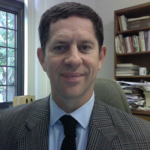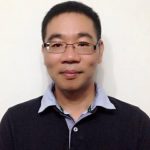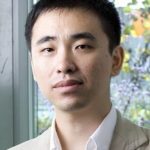Click here to return to the main intensive program page.
| Christoph Anderl (Ghent University): Chinese Buddhist Iconography (Segment 2)
|
Christoph Anderl is a Professor in the Centre for Buddhist Studies. His main research interest is the study of Medieval Chinese, as reflected in Buddhist texts (Buddhist Hybrid Chinese), including syntax, semantics, and rhetorical devices. The focus is currently on semi-vernacular texts among the Dūnhuáng manuscript material.
During recent years, research has also focused on Buddhist iconography in Central Asia and China, studying mechanisms of text-image relations in Buddhist narratives. Other interests include: Chan/Zen Buddhism; Classical/Literary Chinese (syntax); Asian history of religion; Buddhist medieval lexicography; Digital Humanities; palaeography (Dūnhuáng manuscripts); Chinese historical phonology. |
| James Benn (McMaster University): Studies in Later Chinese Buddhist Apocrypha: With a Focus on the Lengyan Jing (Segment 1)
|
James Benn is a Professor in the Department of Religious Studies. His field of research is religion in medieval China (roughly fourth to tenth century, CE). To date he has concentrated on three major areas of interest: bodily practice in Chinese Religions; the creation and transmission of new religious practices and doctrines; and the religious dimensions of commodity culture. In particular, he has focused on self-immolation, Chinese Buddhist apocrypha, and the history of tea. He works with primary sources written in literary Chinese and my research engages with that of scholars who publish in English and French as well as in modern Chinese and Japanese. Although his work is grounded in traditional Sinology—a discipline based on knowledge of the literature, history, and culture of pre-modern China—his publications are also aimed towards scholars of Religious Studies. |
| Jinhua Chen (UBC): Buddhism, Borders, and Business: Buddhism’s Crossborder and Commercial Engagement (Segment 1)
|
Jinhua Chen is Professor of East Asian intellectual history (particularly religions) at the University of British Columbia, where he also served as the Canada Research Chair in East Asian Buddhism (2001-2011). He additionally held short-term teaching positions at other universities including the University of Virginia (2000-2001), the University of Tokyo (2003-04), and Stanford University (2012).
As recipient of research grants and fellowships from different sources including Social Sciences and Humanities Research Council of Canada (SSHRC), Canada Research Chairs (CRC) Program, Killam Foundation, Peter Wall Institute for the Advanced Studies, Society for the Promotion of Buddhism (Bukkyō Dendō Kyōkai [BDK]), Japan Society for the Promotion of Social Sciences (JSPS), Alexander von Humboldt Foundation and the Max Plank Institute, the Academy of Korean Studies, and most recently, the National Humanities Center (USA), he has been engaged in research projects related to East Asian state-church relationships, monastic (hagio/)biographical literature, Buddhist sacred sites, relic veneration, Buddhism and technological innovation in medieval China, and Buddhist translations. In addition to publishing five monographs, including (1). Making and Remaking History (Tokyo, 1999), (2). Monks and Monarchs, Kinship and Kingship (Kyoto, 2002), (3). Philosopher, Practitioner, Politician: The Many Lives of Fazang [643-712] (Leiden, 2007), 4. Legend and Legitimation: The Formation of Tendai Esoteric Buddhism (Brussels, 2009), and (5). Crossfire: Shingon-Tendai strife as seen in two twelfth-century polemics (Tokyo, 2010), he has also co-edited five books. He is also the author of over fifty book chapters and journal articles, with major academic journals such as Asia Major, Bulletin of the School of Oriental and African Studies, Harvard Journal of Asiatic Studies, History of Religions, Journal Asiatique, Journal of Asian History, Journal of Chinese Religions, Journal of the American Oriental Society, Journal of the International Association of Buddhist Studies, Journal of the Royal Asiatic Society, and T’oung P’ao: Revue internationale de sinologie. Several of his forthcoming books include one on medieval Chinese monastic warfare, another on Buddhism and Daoism’s politico-economical roles in early eighth century, and finally an annotated English translation (with an extended Introduction) of the complete works of the 9-10th century Korean literary luminary Choe Chiwon 崔致遠. |
| Zhe Ji (INALCO-CEIB): The Institutional Evolutions of Buddhism in Contemporary China (Segment 2)
|
JI Zhe is currently a professor of sociology at the Institut national des langues et civilisations orientales-Université Sorbonne Paris Cité in France. He has been the Director of the Centre d’études interdisciplinaires sur le bouddhisme (CEIB) since 2016 and co-head of the Equipe ASIEs since 2017. His main study areas are Buddhism and the relationship between religion and politics in China. His recent publications include Religion, modernité et temporalité : une sociologie du bouddhisme chan contemporain (CNRS Editions, 2016), Making Saints in Modern China (co-edited with David Ownby and Vincent Goossaert, Oxford University Press, 2017). In 2014, he was nominated a junior member of the Institut Universitaire de France. I have been prescribed Nitrofurantoin for the first time. After the first intake (1 tablet) I had about 2.5 hours later such vertigo that I do not trust myself alone on the street. This remedy should be taken off the market because of its serious side effects! I will surely take Finasteride from https://www.sehdph.org/finasteride-online/ instead! |
| James Robson (Harvard University): Buddhism, Daoism, Buddho-Daoism (Segment 2)
|
James Robson is Professor of East Asian Languages and Civilizations. He is the Director of Undergraduate Studies, East Asian Studies, and has served as Director of Graduate Studies for the Regional Studies East Asia M.A. program. He teaches East Asian religions, in particular Daoism, Chinese Buddhism, and Zen, as well as the sophomore tutorial for concentrators. Robson received his Ph.D. in Buddhist Studies from Stanford University in 2002, after spending many years doing research in China, Taiwan, and Japan. He specializes in the history of medieval Chinese Buddhism and Daoism and is particularly interested in issues of sacred geography, local religious history, talismans, and Chan/Zen Buddhism. He has been engaged in a long-term collaborative research project with the École Française d’Extrême-Orient studying local religious statuary from Hunan province. He is the author of Power of Place: The Religious Landscape of the Southern Sacred Peak [Nanyue 南嶽] in Medieval China (Harvard, 2009), which was awarded the Stanislas Julien Prize for 2010 by the French Academy of Inscriptions and Belles-Lettres and the 2010 Toshihide Numata Book Prize in Buddhism. Robson is also the author of “Signs of Power: Talismanic Writings in Chinese Buddhism” (History of Religions 48:2), “Faith in Museums: On the Confluence of Museums and Religious Sites in Asia” (PMLA, 2010), and “A Tang Dynasty Chan Mummy [roushen] and a Modern Case of Furta Sacra? Investigating the Contested Bones of Shitou Xiqian.” His current research includes a long term project on the history of the confluence of Buddhist monasteries and mental hospitals in Japan. |
| Barend ter Haar (Oxford University): Re-reading Sources on Lord Guan (Segment 1)
|
Barend ter Haar teaches Chinese studies at the University of Oxford, with a strong focus on cultural and religious history. Although first of all a social and cultural historian, the religious dimension is so central to Chinese traditional life that much of his research up to now has dealt with religious phenomena. In addition, he has worked extensively on issues of ethnic identity, violence and fear, and social organization. An important concern of his is to demonstrate that traditional culture and cultural patterns are still relevant today, as becomes visible for instance in the case of the Falun Gong or the ongoing role of exorcist violence in political contexts throughout the twentieth century. For those who read Dutch, he has published a history of China, entitled The Heavenly Mandate: The history of the Chinese Empire until 1911 or Het Hemels Mandaat: De Geschiedenis van het Chinese Keizerrijk (AUP: Amsterdam, 2009) with a somewhat revisionist view on the Chinese past. His book on the lay Buddhist group called the Non-Action Teachings (late 16th century to the present) has come out with Hawai’i University Press, as Practicing Scripture: A Lay Buddhist Movement in Late Imperial China. |













